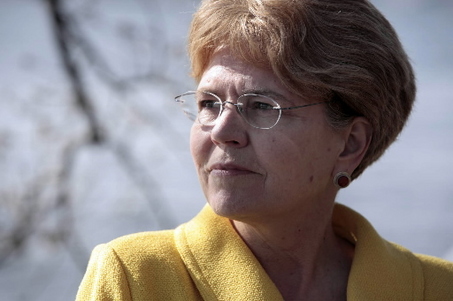forum
library
tutorial
contact

Fresh Eyes, Fragile Deal on Columbia Salmon
by Editorial BoardThe Oregonian, May 25, 2009
|
the film forum library tutorial contact |

|
Fresh Eyes, Fragile Deal on Columbia Salmon
by Editorial BoardThe Oregonian, May 25, 2009 |
 Dr. Jane Lubchenco, Obama's leader on fish issues, arrives to take up the conflicts swirling on the Columbia River
Dr. Jane Lubchenco, Obama's leader on fish issues, arrives to take up the conflicts swirling on the Columbia River
There's a wide belief, apparently shared by U.S. District Judge James Redden, that the Obama administration will bring more money, more water, more ideas, something, to salmon recovery on the Columbia River.
The implication, of course, is that freed from the Bush administration, the fish agencies, the Army Corps of Engineers, the Bonneville Power Administration, all of them, will make a better, stronger effort to save salmon.
Today, Dr. Jane Lubchenco, the former Oregon State University professor chosen by Obama to lead the National Atmospheric and Oceanic Administration, is scheduled to arrive in the Northwest to meet with various parties to the federal lawsuit over the Columbia salmon plan.
Lubchenco is a brilliant scientist, and perhaps she really will bring fresh eyes and new ideas to the decade-long dispute over the federal plan to protect and restore 13 species of Columbia Basin salmon and steelhead. But we don't share this assumption that the federal recovery plan on the table is a "Bush plan," in the sense that it reflects something less than a full and real commitment to Columbia salmon.
Three states, six tribes and dozens of interest groups ranging from ports to utilities also believe in the federal plan. Judge Redden helped spur this historic collaboration on salmon recovery by pushing the parties to come together. In a March court hearing, Redden suggested the federal plan is "very close" to what he wants.
That's why a letter that Redden sent last week to all the parties is so puzzling. The letter is strongly critical of the key strategy in the plan to focus on habitat improvements to offset the harm that federal power-generating dams inflict on fish. Redden attacked the habitat work as "speculative" and "uncertain," but then went on to criticize the government for not identifying more habitat projects, and committing more money for them.
The judge urged the federal agencies to commit more water to increase the flow of the Columbia and Snake rivers. He also sought a contingency, in case the plan fails to recover salmon, that includes studies on breaching four lower Snake River dams. It is hard to square all these demands with the judge's encouragement in March that the plan is "very close" to what he is looking for.
As a researcher, Lubchenco spent years studying fish habitat issues, including marine reserves. Perhaps she can persuade the judge and the other parties that the strong new focus on habitat can truly make a difference on the Columbia.
We suspect that when Lubchenco meets with the parties on the Columbia today and Wednesday, she will see the importance and the fragility of the collaborative agreements that now bind together the states, the tribes and other parties around the federal salmon plan. At the March hearing, Todd True, a lawyer for Earthjustice, one of the environmental plaintiffs, scoffed that "salmon don't swim through collaboration."
They don't swim through litigation, either. This case now has dragged on for years, and now is into its second administration. Every Northwest state, except for Oregon, and most of the region's tribes, are prepared to use this plan as a guide to recover salmon. When Jane Lubchenco finishes her meetings in the Northwest this week, we think she'll conclude that Judge Redden was right the first time. It's very close.
learn more on topics covered in the film
see the video
read the script
learn the songs
discussion forum
